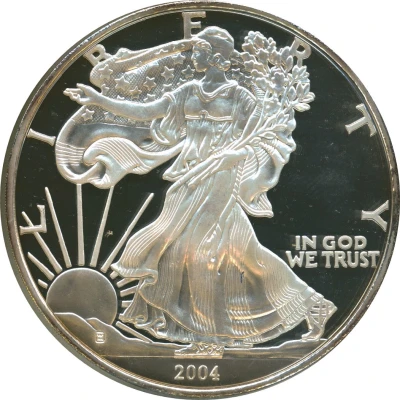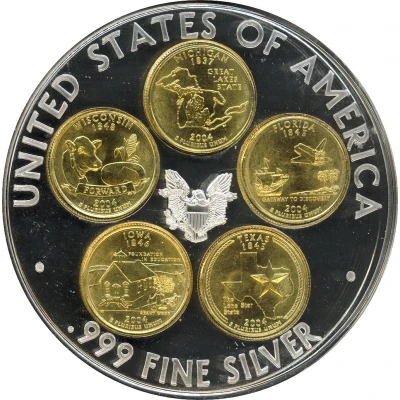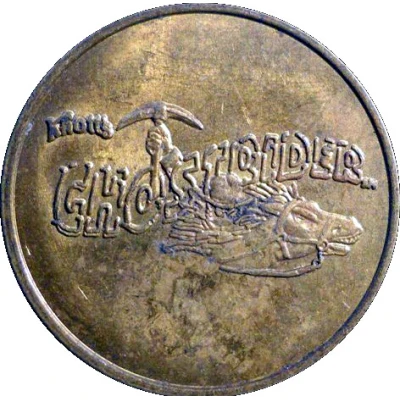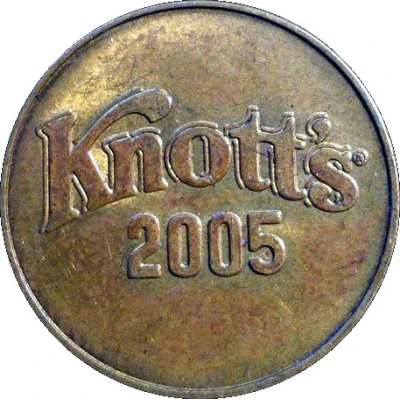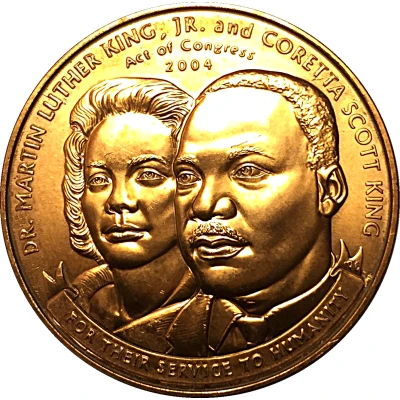
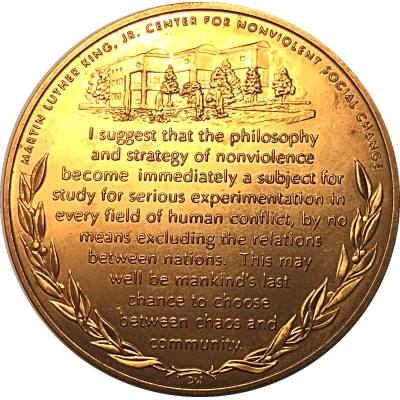

Medal - Martin Luther King, Jr. and Coretta Scott King
2004 year| Bronze | 26.08 g | 38.1 mm |
| Location | United States |
|---|---|
| Type | › Tokens |
| Year | 2004 |
| Composition | Bronze |
| Weight | 26.08 g |
| Diameter | 38.1 mm |
| Thickness | 3 mm |
| Shape | Round |
| Technique | Milled |
| Orientation | Coin alignment ↑↓ |
| Updated | 2024-11-14 |
| Numista | N#144309 |
|---|---|
| Rarity index | 93% |
Reverse
The reverse (tails) features an image of the Martin Luther King, Jr. Center for Nonviolent Social Change, which remains the official legacy of Dr. King's dream of nonviolent social change and full civil rights for all Americans. Below the image of the center is a quote reflective of Dr. King's doctrine of nonviolent social change. The lower half of the medal is encircled with a laurel wreath.
Script: Latin
Lettering:
MARTIN LUTHER KING, JR. CENTER FOR NONVIOLENT SOCIAL CHANGE
I SUGGEST THAT THE PHILOSOPHY AND STRATEGY OF NONVIOLENCE BECOME IMMEDIATELY A SUBJECT FOR STUDY FOR SERIOUS EXPERIMENTATION IN EVERY FIELD OF HUMAN CONFLICT, BY NO MEANS EXCLUDING THE RELATIONS BETWEEN NATIONS. THIS MAY WELL BE MANKIND'S LAST CHANCE TO CHOOSE BETWEEN CHAOS AND COMMUNITY.
Engraver: Donna Weaver
Edge
Plain
Comment
This medal honors Dr. Martin Luther King, Jr. and his wife Coretta Scott King for their many contributions to the Nation on behalf of the civil rights movement. It is a bronze duplicate of the Congressional Gold Medal awarded posthumously by President Obama – on behalf of Congress – to Dr. Martin Luther King, Jr. and Coretta Scott King. King delivered his “I have a dream” address in front of the Lincoln Memorial more than 50 years earlier on August 23, 1963.The Congressional Gold Medal and bronze medal recognize:
The Reverend Dr. Martin Luther King, Jr. and Coretta Scott King as the first family of the civil rights movement, who had distinguished records of public service to the American people and the international community
Dr. King’s doctrine of nonviolent civil disobedience to combat segregation, discrimination and racial injustice
His August 23, 1963, march on Washington that featured his most famous address, the “I have a dream” speech
His assassination on April 4, 1968, in Memphis, Tennessee
Coretta Scott King’s entrance into the civil rights movement in 1955 during the Montgomery bus boycott and the important role she played as a leader of the American civil rights movement
Her devotion to developing and building the Atlanta-based Martin Luther King, Jr. Center for Nonviolent Social Change after her husband’s assassination
Her role in the campaign to establish Dr. King’s birthday as a national holiday
